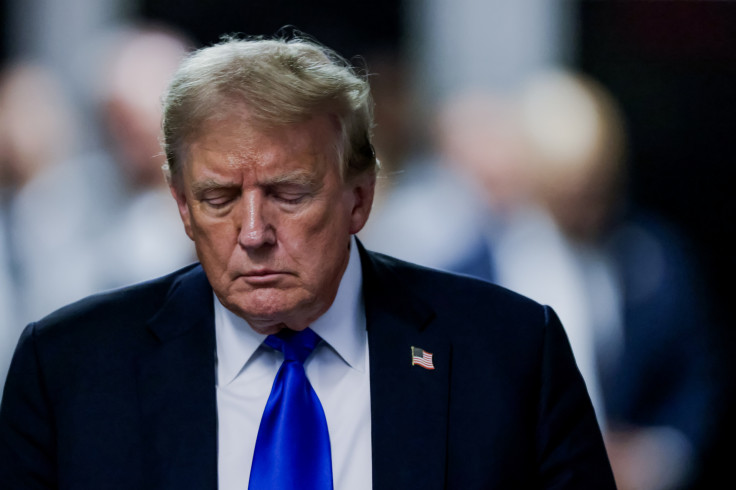
It is officially Election Day in the U.S., and the race for the White House remains a toss up between Vice President Kamala Harris and former president Donald Trump. From democracy, to the economy, immigration and reproductive rights, the stakes for the country in this race are historically high. But Trump has an added layer of personal woes and stakes, tied to his legal disputes, that could determine his fate of whether remaining a free man or going behind bars. If he loses, what will happen next?
Ahead of Nov. 5, Trump faces a plethora of possibilities no other former president or presidential candidate has experienced in American history— being a convicted felon and awaiting the fate of other criminal cases.
Regardless of the outcome, Trump's biggest immediate challenge after the election is his potential sentencing on 34 felony counts of falsifying records in New York. He is tentatively scheduled to be sentenced Nov. 26.
New York Supreme Court Judge Juan Merchan twice postponed the proceeding to give Trump and his attorneys more time to argue on the Supreme Court's July ruling of presidential immunity. They also want the charges against Trump dropped or for him to get a new trial that omits evidence they argue shouldn't have been allowed in light of the high court's ruling. Mechan is supposed to decide on that request by Nov. 12, NBC News reports.
If he wins his reelection bid, Trump has vowed to fire special counsel Jack Smith, who has brought two federal cases against him, "within two seconds"; he has also stated he would punish the prosecutors and judges overseeing his cases, and he will likely avoid serious consequences for any of the criminal charges he continues to face, ABC News reports.
"What if Trump emerges as the victor next week?," former U.S. Attorney and Deputy Assistant Attorney General wrote in a column for the Los Angeles Times. "The difference for him alone would be astonishing. Regaining the White House would amount to a free pass for a presidency and post-presidency that have been nothing short of a crime spree."
Conversely, if he loses to Harris, Trump could face a jail sentence later in the month for his criminal conviction in New York and the possibility of additional criminal trials in 2025. It could also leave him open to additional civil trials in the near future, while he's already appealing $500 million in civil judgments against him, according to MSNBC.
A Trump loss would also leave Smith —who has become a key character in Trump's legal story— with the doors open to pursue the two prosecutions he has brought against the former president, Litman writes. The first one, for his role in trying to overturn the 2020 election, which eventually led to the Capitol insurrection on Jan. 6, 2021. The second one would be for keeping government documents and obstructing the authorities' efforts to recover them from Mar-a-lago, his Florida estate.
When it comes to legal merit, the latter is the strongest criminal case against the GOP nominee.
"The evidence is overwhelming that Trump absconded with documents he had no right to possess as an ex-president and then engaged in a nearly two-year stonewalling of the federal government's entirely legitimate efforts to get them back," Litman wrote.
"His alleged obstruction included lying about the extent of his compliance with a federal subpoena and ordering his co-conspirators to hide documents that he knew the government wanted," he continued. "And for all we know, his sloppy, selfish handling of sensitive information about national security may have put U.S. assets at grave risk."
Trump also faces an election interference case in Georgia. A loss for him could pave the way for Fulton County Superior Court Judge Scott McAfee to set a trial date for the case. He could also appeal the case further, however, posing more delays to a case Willis brought against him in 2023.
But that is not all. This month, another dispute was added to Trump's name. He is now facing another defamation suit brought against him this month by members of the so-called Central Park Five, who have now become the Exonerated Five.
During his presidential debate with Harris, Trump incorrectly said that the men, who are Black and Latino, pleaded guilty in a criminal case in which they'd been charged with assaulting and raping a white woman jogging in New York's Central Park in 1989. He also said they "killed a person ultimately" although the woman is still alive.
They were exonerated in 2002 after the five men, who were teenagers when they were convicted, said they were coerced into confessions by police. A review by prosecutors also included DNA evidence that found the jogger had been attacked by a serial rapist who confessed to the crime after the statute of limitations had expired.
That suit is not expected to be affected by Trump's election given a Supreme Court ruling during the Clinton years that presidents aren't immune from civil suits that aren't related to their time in office.
© 2025 Latin Times. All rights reserved. Do not reproduce without permission.




